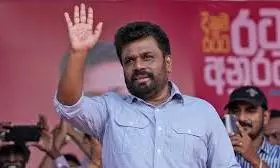
Sri Lankan President Dissanayake secures sweeping victory in snap parliamentary elections
text_fieldsSri Lanka’s President Anura Kumara Dissanayake has emerged victorious in a snap parliamentary election, solidifying his leftist coalition’s dominance in the legislature.
This result gives him the mandate to push forward with anti-poverty and anti-corruption reforms, which are key to the nation’s recovery from a severe economic crisis.
The National People’s Power (NPP), Dissanayake’s Marxist-leaning coalition, won 107 seats out of 225, securing nearly 62% of the vote, or 6.8 million ballots. The result surpasses the majority threshold and brings the coalition close to achieving a two-thirds majority, which is crucial for enacting constitutional changes. The victory marks a sharp turnaround for the NPP, which previously held just three parliamentary seats.
Speaking after the election, Dissanayake described the outcome as a transformative moment for the country. “There is a change in Sri Lanka’s political culture that started in September, which must continue,” he said. Despite the scale of the win, celebrations were modest, with scattered fireworks displays near Colombo.
The election saw a record number of candidates, with over 690 political parties and independent groups contesting across 22 districts. Of the 225 parliamentary seats, 196 were decided through proportional representation, while 29 were allocated based on national vote share. More than 17 million citizens were eligible to vote.
Dissanayake’s closest rival, Sajith Premadasa of the Samagi Jana Balawegaya party, secured just 28 seats with 18% of the vote. The New Democratic Front, led by former President Ranil Wickremesinghe, won only three seats.
The election bolsters Dissanayake’s ability to tackle pressing economic issues, including high living costs and poverty. While the president holds executive authority, parliamentary support is essential for appointing a full cabinet and implementing his ambitious agenda. Among his proposals is the abolition of the executive presidency, a move requiring a two-thirds majority in parliament.
Sri Lanka is still grappling with the aftermath of its worst economic crisis, which saw the country default in 2022 due to a currency shortage. The economy contracted by 7.3% in 2022 and by 2.3% in 2023. An International Monetary Fund (IMF) bailout worth $2.9 billion has provided some stability, but many citizens continue to struggle with the high cost of living.
Dissanayake plans to renegotiate parts of the IMF program to reduce income tax rates and allocate more resources to social welfare initiatives. However, analysts caution that such changes could slow future IMF disbursements, potentially jeopardizing the country’s fiscal goals, including achieving a primary budget surplus of 2.3% of GDP by 2025.























